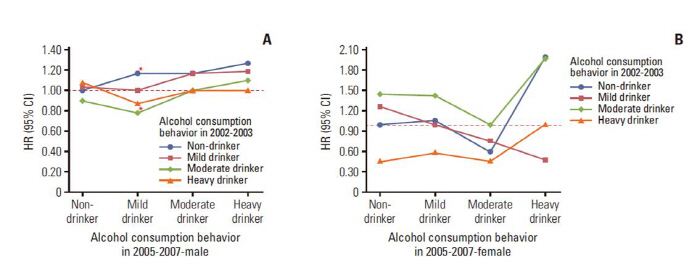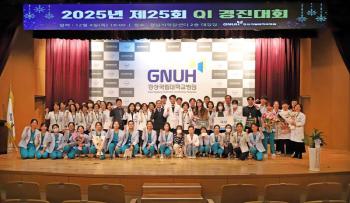Oh, the amount of alcohol you drink has increased…Gastric cancer risk increased by up to 14%
|
A research team led by Professor Kim Na-young of the Department of Gastroenterology at Seoul National University Bundang Hospital (Professor Choi Yong-hoon of the Department of Gastroenterology and Dr. Jang Ji-eun of the National Cancer Center) classified 311,192 adults over the age of 40 based on the health examination data of the National Health Insurance Service as △ hardness (15g for men, less than 7.5g for women), △ moderate (15-29.9g for men, 7.5-14.9g for women), △ high dose (30g for men, more than 15g for women) and followed up for an average of 12 years.
According to the research team, regardless of the current alcohol intake, the increase in alcohol consumption served as a clear risk factor for gastric cancer, and abstinence from alcohol or abstinence had the effect of lowering the risk of developing the disease. For example, even if non-drinkers enjoy drinking at a light level, the risk of stomach cancer increased by 14% (relative risk of 1.14), while moderate drinkers reduced the risk of developing the disease by 20% (relative risk of 0.80).
The pattern was different for each man and woman. Men had about 10% lower risk of developing gastric cancer in non-drinkers than in drinkers, and the group with increased intake had about 10% higher risk, indicating a relatively clear link between changes in drinking volume and the risk of developing gastric cancer. On the other hand, women had a low overall association, but when intake surged from non-drinking to high-dose drinking, the risk of gastric cancer doubled, requiring attention to binge drinking.
The results of this study are meaningful because they specifically reveal the link between changes in drinking volume and the risk of developing gastric cancer by type and suggest that treatment strategies such as customized abstinence and abstinence education are needed considering gender differences. While studies examining the link between drinking and stomach cancer have mainly focused on absolute drinking, this is the first time that long-term studies have revealed the effects of actual behavioral changes.
Professor Kim Na-young said "A study that revealed that not only the high and low levels of drinking, but also the recent changes are deeply related to the risk of gastric cancer. Continuous improvement of lifestyle in the direction of resection or complete abstention plays an important role in preventing gastric cancer."
Professor Kim then said, `In particular, if you have removed early gastric cancer with an endoscope or have high-risk factors such as family history and smoking, you absolutely need to abstain from drinking, and if it is difficult, you should try to reduce the amount of alcohol as much as possible.'
On the other hand, this study was conducted with the support of the 2024-2027 「Korea Research Foundation Support Project」, and was recently published online in the official journal 『Cancer Research and Treatment』 of the Korean Cancer Society.
|
|
This article was translated by Naver AI translator.






